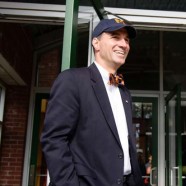
by Todd B. Bland
Recently, a student writing for The Milton Paper asked me about my legacy — how I’d like to be known, once my tenure at Milton is complete. My list of goals is long, as you might imagine. Toward the top of that list is helping us all — as individuals and as an institution — be self-aware. We’d all agree that a data-wise leader is a more effective leader. The same is true for anyone undertaking an important endeavor: The more you know, the better equipped you are to move ahead purposefully, responsibly. Gaining and considering honest, objective information about yourself, however, is a particular skill.
When we worked together to name strategic priorities, we identified three types of competencies that an excellent school cultivates in its students: cognitive, interpersonal and intrapersonal. The third set, intrapersonal, includes metacognition, the awareness and understanding of one’s own thought process. The ability to self-assess, honestly, is a foundational skill that we try to develop in our students.
How do we approach this skill? We search for what I call “clean mirrors” — people or tools that help us see ourselves clearly. We begin by reflecting and inviting feedback. Voices that are simply loud, or persistent, or delivered from a powerful position aren’t necessarily good guideposts, however. We need broad-based information, and context. This means research, analysis, and using real data to inform our work.
Last January, Milton partnered with Hanover Research, a broad-based research and development firm, to enhance our internal means of collecting information, conducting longitudinal studies, and locating benchmarks for comparison. Last spring, through a survey developed with parent input, we invited all Milton parents to tell us about their overall experience with Milton and our communication with them. (We plan to survey parents in this way at regular intervals.) In the analysis, we are learning so much, directly from the data. The results confirm some preconceived notions and challenge others. We are learning more about ourselves in a systematic and productive way.
Understanding the lived experience of all our constituents — alumni, students, parents, faculty and staff — is important. We must also have a firm grasp on how we compare with other institutions. Often, we learn that other schools face the same challenges that we do, but that feel unique to us. We learn where we are positioned well, comparatively, and where our performance has been only sufficient. These realizations can, and should, be motivational. For instance, our peer schools rely on endowments that are three to four times the size of Milton’s endowment. To recruit and retain the country’s top teachers, to enroll the most talented and motivated students in the world, we have to change that. Increasing the endowment is the driving need inspiring the campaign that we will launch publicly this fall.
Self-assessment is not a new orientation for Milton, but we are entering a time of greater attention to analytics. As we renew our curriculum, as we develop our faculty’s lifetime teaching skills and roll out a phased, robust faculty compensation plan, we are enlisting outside partners to help us do this work thoroughly and well. I have named collecting data that informs our work as an objective for my leadership team, and for us as a School. All of this work, true of everything we do, is to improve our students’ experience — in and out of the classroom — and fulfill our mission. Educators should model the ideals that we inculcate in our students. One measure of excellence, as a School, is how well we do this.



